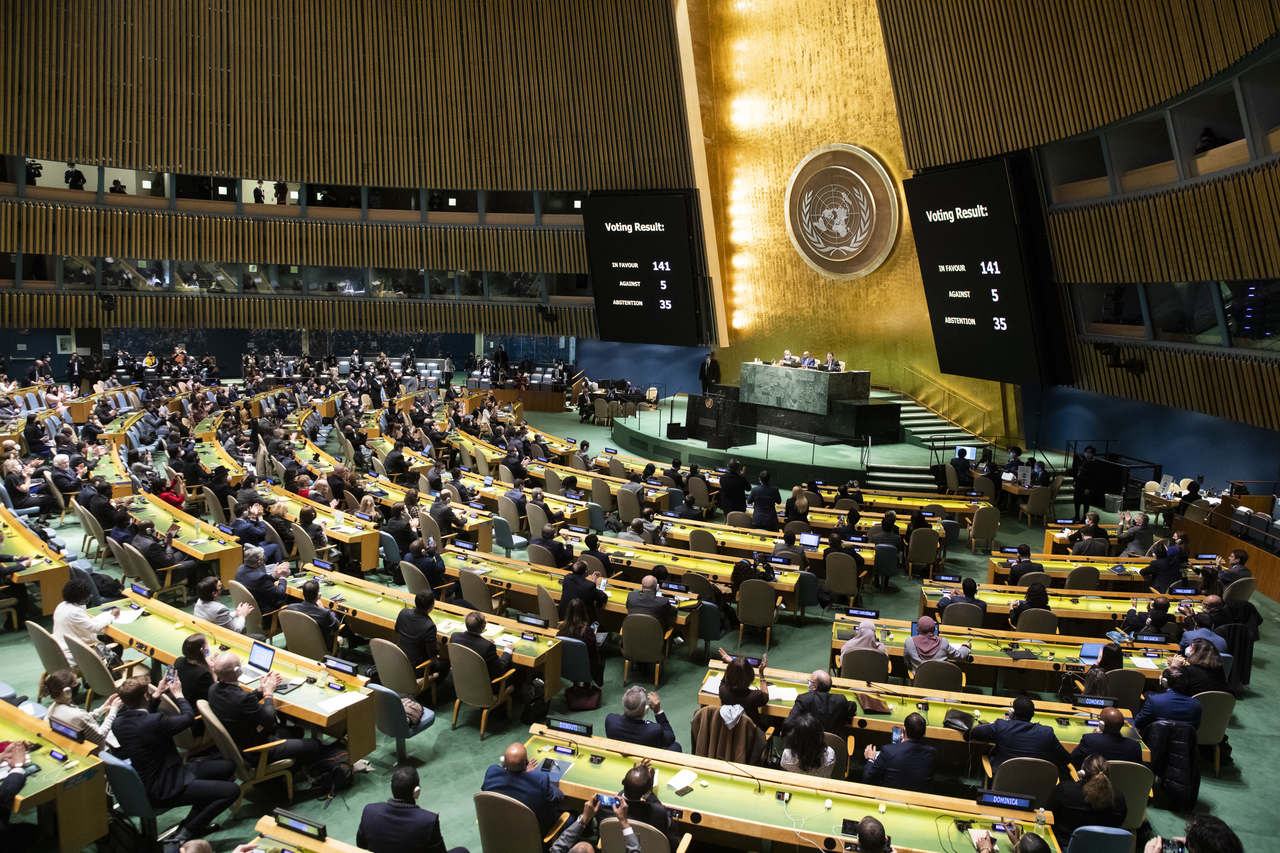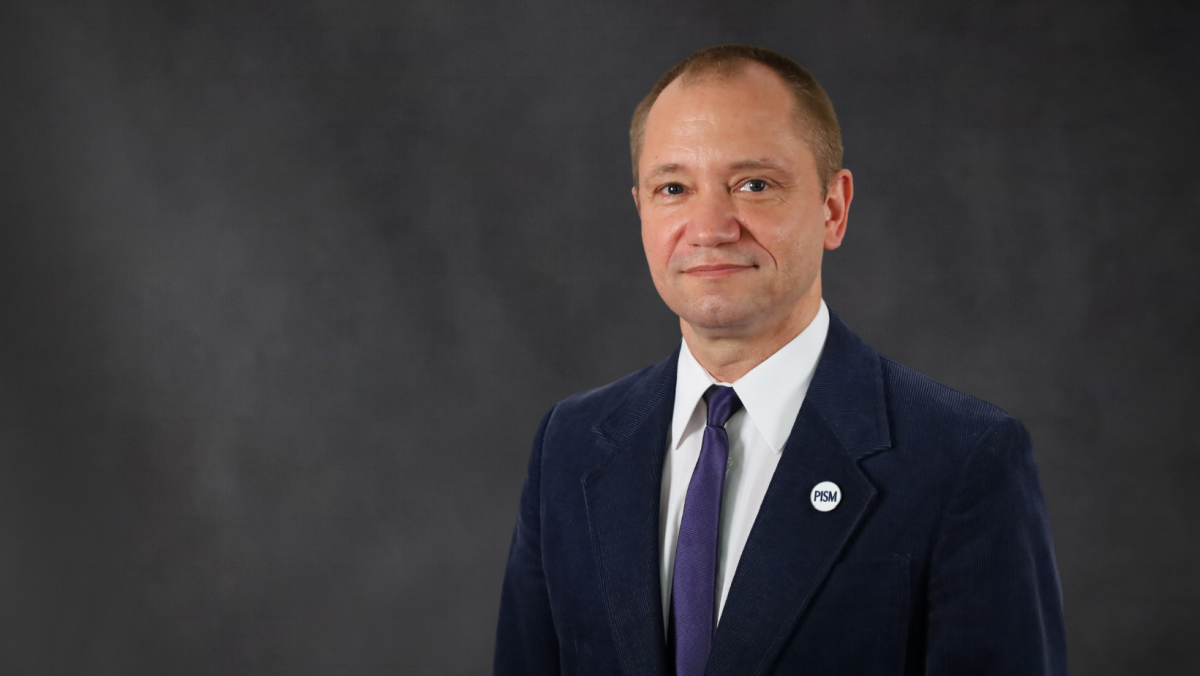The Question of Russian Aggression against Ukraine at the UN
In response to the Russian attack on Ukraine, an emergency session of the United Nations (UN) General Assembly (UNGA) adopted, under the Uniting for Peace procedure, a resolution condemning this act of aggression. The UNGA called on Russia to cease hostilities and to withdraw unconditionally from the internationally recognised territory of Ukraine.
 Fot. Wang Ying/Xinhua News Agency/Forum
Fot. Wang Ying/Xinhua News Agency/Forum
What actions were taken at the UN?
Preparations for the Russian aggression and the growing tensions between Ukraine and Russia were reflected at the UN. In the period leading up to the Russian attack, the UN Security Council (UNSC) met four times on issues concerning Ukraine, as a result of rising tensions in the east of the country (the concentration of Russian forces) and Russian efforts to recognise two separatist entities in eastern Ukraine, the so-called “Donetsk People’s Republic” and the “Luhansk People’s Republic” (DNR and LNR). Just before the attack, on 23 February, the UNGA also considered the issue of “The situation in the temporarily occupied territories of Ukraine”, which was placed on the agenda. On the evening of the same day, after the DNR and LNR authorities requested military assistance from Russia, the UNSC met for an extraordinary session at the request of Ukraine. This meeting was interrupted as a result of the start of hostilities.
What action did the UNSC take after the Russian aggression?
Under the UN Charter, the UNSC has the right to investigate any dispute or any situation likely to give rise to a dispute, in order to determine whether the continuation of such a situation threatens the maintenance of international peace and security (Chapter VI of the UN Charter). Where a threat, violation or act of aggression is found, the UNSC makes recommendations or decides what measures should be taken to maintain or restore international peace and security (Chapter VII of the UN Charter). A draft resolution on this issue tabled on 24 February—the day of the start of the Russian invasion of Ukraine—was not adopted over a Russian veto. Eleven UNSC members voted in favour, while three abstained (China, India, and the UAE). To avoid another veto, on 27 February the UNSC voted on a procedural issue (majority decides) on a resolution to convene an extraordinary session of the UNGA (the 11th in UN history, the last being in 1997, on the issue of Palestine) and for the UNGA to debate the aggression against Ukraine under the Uniting for Peace procedure.
What is the Uniting for Peace procedure?
The first time this procedure was used was in 1950 to override a veto by the USSR on the situation in Korea (the so-called Acheson Resolution). Since then it has been used 11 times (e.g., in 1956 after the Soviet aggression against Hungary and in 1980 after the aggression against Afghanistan). This procedure, known as “Uniting for Peace” (U4P), is initiated by the UNGA by a two-thirds majority vote when the UNSC is unable to fulfil its responsibilities due to the lack of unanimity of the permanent members. If the UNSC fails to carry out its primary responsibility to maintain international peace and security in the event of a threat to peace, breach of the peace, or act of aggression, the UNGA should immediately consider the matter with a view to making appropriate recommendations to members on collective measures. Pursuant to the 1962 ICJ Advisory Opinion on Certain Expenses of the United Nations, the UNGA has the power to recommend that all necessary steps be taken to resolve a crisis peacefully (this may include collective action), but with the exception of coercive action. The decision to use appropriate coercive measures to restore international peace and security—that is, to impose sanctions or use force—can only be taken by the UNSC.
What does the UNGA resolution adopted on 2 March contain?
UNGA Resolution A/RES/ES-11/1 was adopted with 141 votes in favour, 35 abstentions (including China, India, and Cuba) and 5 votes against (Russia, Belarus, Syria, North Korea, Eritrea). Twelve countries did not take part in the vote (including Venezuela and Ethiopia). This is the highest support for a resolution in the history of the Uniting for Peace procedure. The UNGA stressed support for the sovereignty, independence, and territorial integrity of Ukraine within its internationally recognised borders. It condemned the Russian aggression as a direct violation of Article 2(4) of the UN Charter. UN members demand the immediate cessation of hostilities by the armed forces of the Russian Federation and their unconditional withdrawal from the territory of Ukraine. The UNGA considered Russia’s decision of 21 February to recognise the independence of the two separatist entities in eastern Ukraine, the DNR and LNR, as a violation of the provisions of the UN Charter and called for its immediate revocation. The UNGA deplored Belarus for its involvement in the aggression and called on it to abide with its international obligations. The resolution also stressed the importance of Ukraine for global food production.
What will the international community do next?
Russia’s use of armed force against Ukraine is a violation of Article 2(4) of the Charter of the UN. In response to the aggression, Ukraine has exercised its right of self-defence. The prohibition of aggressive war is regarded in international law as a peremptory norm, so it is incumbent on the other members of the international community to prevent any further violation of it, and to refrain from recognising the consequences arising from its violation. Assistance given to Ukraine (including supplies of military equipment) has a legal basis and does not constitute an act of aggression. The international community should also act to implement the provisions of the UNGA resolution of 2 March and restore the territorial integrity of Ukraine within its internationally recognised borders. However, the doubts raised at the UN by the Ukrainian side regarding the legality of the Russian Federation’s permanent seat on the UNSC after the collapse of the USSR appear to be too far-fetched (due to the lack of protest at the Russian Federation’s declaration of the assumption of the seat in the UNSC). The blatant violation of international law by a permanent member of the UNSC, however, once again raises the question of reform of this body.


